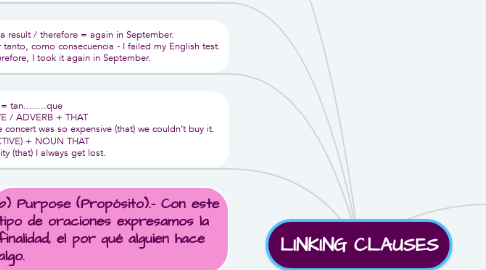LINKING CLAUSES
por Ana Gonzalez


1. - The train had left before they got to the Before / after = antes de (que) station / después de (que) - She went to the gym after she had done her homework. Until = hasta (que) - We were waiting until she arrived
2. For + noun / -ing form - A knife is used for cutting In case significa por si acaso In case + present → para referirse al presente + past → para referirse al pasado Ej: - I will take an umbrella in case it rains. - We bought an extra ticket in case Martin wanted to join us.
3. - I’ll phone you when I know the answer While = mientras (que) - While I was watching TV, the telephone rang. As soon as = tan - I’ll phone you as soon as I know the answer. pronto como - As soon as he had finished studying, he left.
4. As a result / therefore = again in September. por tanto, como consecuencia - I failed my English test. Therefore, I took it again in September.
5. so / such....that = tan........que SO + ADJECTIVE / ADVERB + THAT The ticket for the concert was so expensive (that) we couldn’t buy it. SUCH + (ADJECTIVE) + NOUN THAT It is such a big city (that) I always get lost.
6. a) Reason (Razón).- Podemos expresar la causa mediante los siguientes nexos:
6.1. Because = porque Because of = por, debido a La diferencia entre ambos nexos es que el primero va seguido de una oración (con sujeto y verbo) y el segundo va seguido de nombre. BECAUSE + CLAUSE We moved to another city because my father got a new job. BECAUSE OF + NOUN We moved to another city because of my father’s new job. As /since = como, puesto que. - As it is your birthday, I’ll lend you my best clothes. Normalmente van al principio de la frase Otros nexos causales: due to, owing to = debido a
7. b) Purpose (Propósito).- Con este tipo de oraciones expresamos la finalidad, el por qué alguien hace algo.
8. d) De tiempo (Time).- Los nexos más usuales que introducen este tipo de oraciones son los siguientes:
8.1. - As I was walking down the street, I saw When / as = cuando my ex-boyfriend.
9. e) De contraste.- Los nexos que introducen este tipo de oraciones concesivas son los siguientes.
9.1. -Although / even though / though = aunque van seguidos de una oración (con sujeto y verbo) ALTHOUGH / EVEN THOUGH / THOUGH + CLAUSE Ej: Although he didn’t have money, he bought the most expensive car.
9.2. In spite of / Despite = a pesar de van seguidos de nombre o un verbo sustantivado (en – ing). ALTHOUGH / EVEN THOUGH / THOUGH + CLAUSE Ej: In spite of not having money, he bought the most expensive car. Despite the rain, we went out for a walk.
9.2.1. To + infinitivo - I went to the university to talk to one of my teachers. In order to / - I went to the university in order to talk to one of my so as to teachers. (more formal)
